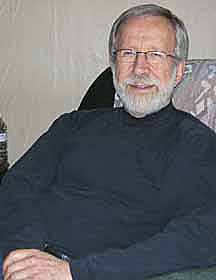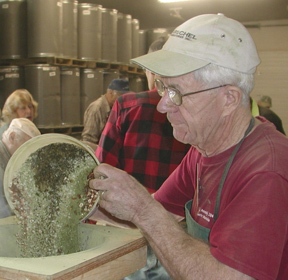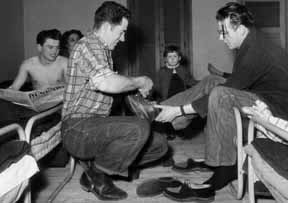Canadian Mennonite
Volume 11, No. 11
May 28, 2007

Fulfilling the Lord’s purpose: A legacy of care and prayer
Winkler, Man.
 |
On the doorstep to retirement, Don Dyck, together with his wife Gloria, approaches the future with the same prayerful discernment that he did every day of his 41-year medical practice.
Dyck came to southern Manitoba from St. Boniface Hospital in the fall of 1975 to pioneer Manitoba’s first rural-based radiology department. Of his decades of service, he says, “I made it a practice to say a quiet prayer before I interacted with a patient, especially when I knew I was bringing bad news.”
“What always amazes me,” he says, “is the influence you have on a patient and when they tell me that they feel at peace with the things that are happening, whether it’s an ultrasound or a biopsy.”
His 2003 Physician of the Year Award scarcely receives mention as he reflects on his years as a radiologist. Dyck was recognized for his pioneering and visionary work in the field of radiology. The imaging centre he established in Winkler was the first in rural Manitoba to provide several special procedures. It became the first real-time ultrasound department in Manitoba in 1982. New developments in radiology continued to follow in his wake.
Another highlight of Dyck’s vocation has been “the actualization” of the Boundary Trails Health Centre, which opened in 2001, and the impact it has had in the community. It was in the 1970s that Dyck first brought physicians together to talk about a regional hospital.
“We were concerned about the communities of Altona and Carman feeling threatened, and did not want to see this become a turf war, but a place where people could benefit from the next level of care, rather than needing to go to Winnipeg,” he says, noting that a new addition will open this summer, enabling the hospital to offer magnetic resonance imaging (MRI) services.
In a profession that is publicly funded, Dyck voices his faith with discretion but lives it boldly. He acknowledges that there are times when he feels he has compromised. “I feel uneasy and disquiet every time I have to do ultrasound examinations for pre-termination,” he says. “On the other hand, I’m not militantly anti-abortion. Rather than being dogmatic about our values, we need to offer our love rather than our judgement.”
Dyck defines radiologists as “the gatekeepers to the imaging world,” but admits that “we are less than perfect.” According to him, health care costs are often higher than necessary, “sometimes due to patient expectations, sometimes laziness. Trying to make sure appropriate procedures are done is not always easy.”
Although this presented challenges and conflicts, Dyck never lost his concern for quality control. He was recognized for this in 2003, when his colleagues wrote, “He set up a quality assurance program so patients and their referring physicians could be confident that the correct diagnosis and appropriate interventions were being made.”
Gloria Dyck is not surprised that staff gave her husband strict orders not to retire! She credits his gentle spirit and devotion to patient care on a 24-7 basis. “For 35 years he’s there every day at the same time,” she says. “If there’s a patient booked at 8 a.m., he’s there on time. Our alarm rings at 6:30 every day.”
A member at Covenant Mennonite Church in Winkler, Don Dyck gives a physician’s perspective on sharing times at church. While appreciating the opportunity to share one’s struggles within the faith community, it becomes quite uneasy and awkward when sharing time becomes a medical update time, he says, suggesting instead, “Simply say, ‘God knows the needs,’ unless you’ve checked with the patient or the patient has requested the information to be shared.”
At 68, Dyck is not sure where the future will lead. For certain, though, it will include the couple’s four children and 11 grandchildren, and perhaps he will become more involved in his wife’s concern and activism in creation care.
Wherever the future leads, Dyck is approaching it with the same mindfulness that he exercised every day at work: “Direct us, Lord, to the fulfilling of your purposes.”
Youthful experience leads to lifetime of service
Winnipeg
 |
An overseas service assignment with Mennonite Central Committee (MCC) 50 years ago has fostered a lifetime ethic of service for a Winnipeg man.
“What is my motivation? I think it would be my compassion for others,” says Arthur Driedger, 73, who spends Wednesday afternoons at Concordia Hospital providing spiritual care visits and Thursday mornings assisting with pick-up services for Winnipeg Harvest.
Even when it is time for a vacation, he and his wife Kathleen look for practical ways to improve life for others. The couple spent two weeks earlier this year working at Fraser Valley Gleaners Society, a faith-based agency in Abbotsford, B.C., that processes surplus food for distribution to people in need. It was their fifth short-term mission assignment with Services Opportunities for Older People (SOOP), a program jointly sponsored by MCC Canada, Mennonite Mission Network and the Mennonite Association of Retired Persons.
“It all started with Pax,” says Driedger, recalling how his involvement in MCC’s post-war relief and refugee efforts raised his awareness of peacebuilding and social responsibility. “Pax,” a Latin word meaning “peace,” was an MCC program begun in 1951 to provide alternative service options for conscientious objectors in Canada and the United States. It quickly grew into a dynamic program that contributed towards MCC’s relief, rehabilitation, reconciliation and development projects in 42 countries over the following 25 years.
Driedger was 23 years old when he left the family farm in Leamington, Ont., in 1956 to participate in Pax.
 |
“They referred to us as Pax-boys,” he says. “We were young guys…19 to 24. We were quite inexperienced, but we could do what needed to be done. We saw Pax as a practical expression of our Christian faith.”
Following a short orientation in Akron, Pa., Driedger sailed to Rotterdam on the S.S. Maasdam, a Holland-American Line passenger steam ship. Accompanying him on this 10-day voyage were four other Pax participants—Reynold Kipfer, Wayne Schertz, David Herschberger and Roger Von Gunten.
“We all went to different assignments,” recalls Driedger, noting that he and Herschberger went to Austria to assist Hungarian refugees after the revolution of Budapest, Kipfer and Schertz went to Jordan to assist Palestinian refugees, and Von Gunten went to Algeria to work on agricultural development projects.
During his two-year assignment, MCC had identified a need to provide a residential centre for mothers with young children waiting in refugee camps for settlement in West Germany. Driedger was appointed as the first director of this home. When Driedger returned to Canada, MCC appointed a permanent director for the home, which was closed in 1963 when the Berlin Wall was erected to stem the flow of refugees. Driedger also worked in a Red Cross refugee camp in West Berlin, caring for internal refugees fleeing from East Germany to West Germany via Berlin.
His return to Canada, he says, marked the beginning of a lifelong commitment and passion to promote nonviolent peacebuilding and social justice. He went on to spend most of his life working for MCC.
The Pax experiences also had a lifelong impact on the lives of the four other men who started their Pax assignments when he did. All five reunited for the first time in Elmira, Ont., last fall for a 50-year reunion.
“It was interesting to hear how Pax had influenced their lives,” says Driedger, noting that all of the men became involved in their local churches and communities. Kipfer served as a pastor in Ontario, Manitoba and Saskatchewan, and worked as regional director with Youth for Christ in western Manitoba. Herschberger moved to Canada from Illinois and worked as a missionary in aboriginal communities in northern Ontario. Von Gunten returned to his home community in Berne, Ind., and took over his parents’ dairy farm. Schertz became a cabinetmaker and finishing carpenter in Goshen, Ind.